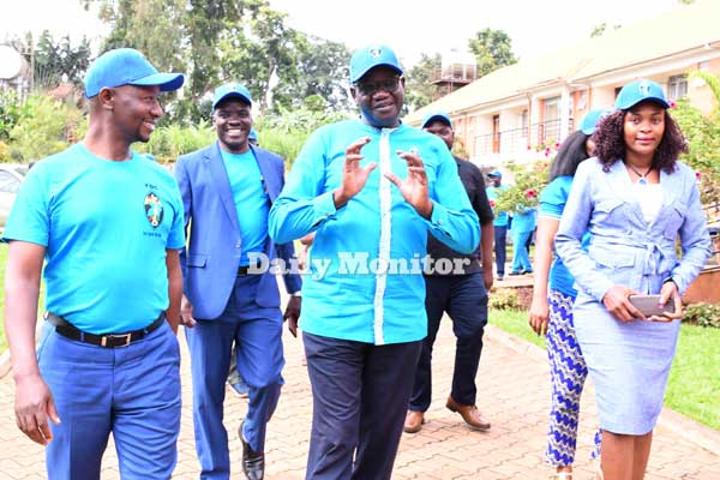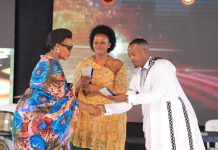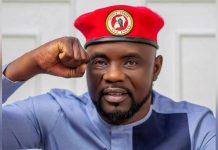Africa-Press – Uganda. In 2011, the Forum for Democratic Change (FDC), which was tired of playing the spectator’s role as the National Resistance Movement (NRM) chose the Speaker in Parliament, decided to present an alternative.
The alternate that the FDC presented was Mr Nathan Nandala Mafabi, the Budadiri West MP who knew he stood no chance against NRM’s Rebecca Kadaga – who had been Deputy Speaker for 10 years – going by the utter majority the NRM had in Parliament.
But in a show of the much-needed unity, Democratic Party (DP), Jeema, Uganda Peoples Congress (UPC) and a few Opposition-leaning Independents joined their FDC colleagues in voting for Mr Mafabi who predictably lost, having garnered only 57 votes.
In 2016, the Opposition didn’t present a candidate as Ms Kadaga cruised to a second term, but this year some within the Opposition sought to replicate the 2011 scenario. However, the idea looks to have backfired as it simply opened a can of worms.
Once Allan Ssewanyana, the Makindye West legislator, was given the enviable role of nominating Kira Municipality legislator Ibrahim Ssemujju Nganda for the post of Speaker on Monday, he went for a rather interesting tactic in a bid to unify the Opposition which was undoubtedly in confusion.
Mr Ssewanyana, who belongs to the largest Opposition party in Parliament, the National Unity Platform (NUP), knew that his party wasn’t voting for FDC’s Ssemujju but in fronting him, he sought to remind the country of our recent history.
If there was a moment in which the Opposition was seen to be pulling in the same direction, it was during the 2017 efforts to stop President Museveni and his party from editing out the presidential age limits from the Constitution.
On Monday, Mr Ssewanyana sought to refresh the minds of his Opposition colleagues of the dark days when the Special Forces Command (SFC) personnel burst into the House during the chaotic debate of the lifting of the presidential age limit and beat the hell out of Opposition MPs while Mr Ssemujju’s opponent, Ms Kadaga, who was presiding over the House, retreated and hid in her office.
Though he wasn’t in charge of the House, Mr Ssewanyana, nevertheless, also accused Deputy Speaker Jacob Oulanyah, Mr Ssemujju’s other opponent, of cheering on wherever he was, as the Opposition was being clobbered by Mr Museveni’s elite force.
Clearly, this was a tactic to free Mr Ssemujju from Mr Oulanyah, NRM’s candidate, and Ms Kadaga, the NRM’s first Vice Chairperson, who had rebelled against her party and stood as an independent following a fiercely contested primary. Before NRM could attack Mr Ssewanyana, it was the Opposition that attacked him for the speech he had given.
“He hasn’t made any sense,” NUP’s Joseph Gonzaga Ssewungu, who represents Kalungu West, said before the MPs could cast their votes at Kololo. “He hasn’t made a good case for his candidate.”
Although there are more than 90 Opposition MPs, with NUP having 57, FDC 32, and DP with eight, Mr Ssemujju got only 15 votes while his party colleague Yusuf Nsibambi, the Mawokota South MP, who stood for Deputy Speaker, got 35 votes as the NRM’s Anita Among cruised to victory with 415 votes.
Coming into the elections, it looked like NRM was thrown into pandemonium with Ms Kadaga threatening to instigate a rebellion within the party and threaten Mr Museveni’s control over it. In a dramatic turn of events, Mr Museveni by Monday night was jubilant.
Using what he termed as “guerrilla tactics,” the ageing President had made several phone calls late on the weekend before the elections and managed to mobilise his party MPs, including Independents, to support Mr Oulanyah who easily won with 310 votes, leaving Ms Kadaga with 197 votes, and Mr Ssemujju in his wake.
“I rang a number of our people, even in the night,” Mr Museveni basked in glory of his efforts. “You saw how the guerrillas work. Those guerrillas are very dangerous, once they start working they have no time limit. I was ringing some people at 11:30[pm], at 12 in the night, saying ‘now you have been with Kadaga, the official candidate now is Oulanyah.”
From a look at the results, it was clear that the Opposition MPs had voted both NRM’s Kadaga and Among and this has left the Opposition much more divided than they were before the night.
NUP leader Robert Kyagulanyi, aka Bobi Wine. PHOTO/ FILE
“They were opportunistic, that they went for Kadaga who had numbers,” Mr Ssemujju, who has been the Opposition Chief Whip, said referring to Opposition MPs who voted for Ms Kadaga.
“You heard even when she was nominated, they were the ones clapping here. Now that has taught them a lesson. I mean, how do you vote the NRM’s Vice Chairperson? And you even clap and even cry when she has lost.”
The fallout in the Opposition has predictably come down to two parties: NUP and FDC with each accusing the other of double standards and betrayal. When Mr Ssemujju declared his candidature for speakership, he said he wrote to all Opposition parties seeking their support, but no party responded formally to his letter.
While NUP kept everyone guessing on who it was going to support since it had not presented a candidate, several NUP MPs, on condition of anonymity, had informed this writer that Robert Kyagulanyi Ssentamu, alias Bobi Wine, the party’s principal, had told them months ago to back Ms Kadaga.Despite the fact that Ms Kadaga has bragged about facilitating the removal of the age limits – something the Opposition see as a catastrophe – the advances between NUP and Ms Kadaga have been apparent.
During last year’s presidential campaigns, Mr Kyagulanyi promised a crowd of voters in Kadaga’s native Kamuli how if he wins the elections he will give her a big position in his administration. Again this relationship was visible in March when Kadaga launched her campaign for speakership.
It was graced by NUP MPs Bashir Kazibwe Mbaziira, who ousted FDC’s Mubarak Munyagwa from the Kawempe South seat, journalist-turned-politician Joyce Bagala, who ousted Information minister Judith Nabakooba from the Mityana Woman MP seat, and Christine Kaaya Nakimweero, who defeated NRM’s Chief Whip Ruth Nankabirwa for the Kiboga Woman MP slot, and Mr David Lukyamuzi Kalwanga, who retained his Busujju County seat. All indicated their willingness to support Ms Kadaga.
“I will vote whoever stands a chance of winning,” NUP’s Muhammad Muwanga-Kivumbi, who represents Butambala County said, indirectly saying he will vote for Ms Kadaga who they thought would beat Mr Oulanyah. Another theory the MPs advanced for supporting Ms Kadaga is that she is the lesser evil compared to Oulanyah who they claimed is Mr Museveni’s blind follower, something Mr Ssemujju laughed off. Mr Ssemujju has accused Ms Kadaga of turning Parliament into her personal estate.
As the internal NRM race between Mr Oulanyah and Ms Kadaga approached, NUP claimed they would support Ms Kadaga only if she comes as an Independent. This meant they didn’t consider supporting Mr Ssemujju under any circumstances.
While it’s understandable that NUP might not like Mr Ssemujju – who turned out to be the only FDC legislator in Buganda who successfully defended his seat without supporting Mr Kyagulanyi’s presidential bid – the same can’t be said of Mr Nsibambi. When he announced his candidature for Deputy Speaker, Mr Nsibambi had counted on the alliance of convenience he had forged with NUP.
Though Mr Nsibambi is an FDC founding member, he didn’t support Mr Patrick Oboi Amuriat, his party’s presidential flag bearer. Instead, he morally and financially supported Mr Kyagulanyi and other NUP candidates in Mpigi District where Martin Ssejjembe, a 28-year-old NUP member, is now the district chairperson.
Though it’s hard to know who voted for who since it was a write-in secret ballot, the mere fact that Mr Nsibambi got only 35 votes yet NUP MPs are 57 shows that many of them didn’t back him, something that has left the veteran lawyer livid with rumours being peddled that his rival camp doled out money to win over the Opposition.“I have come to realise that many of these Opposition MPs don’t go to Parliament to work for the people, they go there to make money,” said Mr Nsibambi, who for years had hesitated to take part in elective politics and is now making his debut in Parliament.
FDC, NUP clashBut the clash between FDC and NUP has been long in coming. During campaigns, NUP managed to defeat FDC incumbents, more so in Kampala, and senior FDC officials have since accused the new party of unleashing “a smear campaign” against their party to achieve short-termed benefits.
In May, perhaps trying to drive the agenda since it’s now the biggest Opposition in Parliament, Mr Kyagulanyi wrote to FDC asking for a meeting and its agenda was to apparently discuss the aftermath of the January general election.
“As we agreed in the past, a struggle like ours requires joint efforts by the forces of change. As we embark on a new phase, we would desire to reconnect with your leadership and discuss the way forward, including how to maximise the different fronts available for the benefit of the struggle,” the letter read in part.But FDC secretary general Mafabi responded, ruling out the meeting on grounds that Mr Kyagulanyi hadn’t stated in his letter the agenda of the meeting.
Party members, according to sources within FDC, weren’t happy that Mr Kyagulanyi had written to Mr Amuriat, FDC’s party president yet political party protocols are that such communications are addressed to the party secretary general.
When NUP released the names of new leaders of Parliament, which included leaders of accountability, Lucy Akello, the Amuru District Woman MP, was the only FDC member who was given a position. This shows the direction the conflict is taking.
InterpretationThe refusal by NUP to support FDC candidates has been interpreted as revenge for having rejected their meeting, but NUP supporters also insist that there’s a problem with FDC since not all its MPs voted for Mr Ssemujju, for instance.
FDC hasn’t hidden from that fact and it says in the coming week it will be communicating what’s going to do about MPs who defy party positions.
“The party sat yesterday to, among other things, review the conduct of MPs,” Mr Ssemujju, who is FDC’s mouthpiece, said. “Journalists are presenting this as Ssemujju’s problem. But you saw FDC MPs who proposed Ssegirinya [Kawempe North MP] for the position of Deputy Speaker and another one seconding him, yet the party had a candidate. There was another MP who stood up and said because of gender issues, no one should run against Anita Among.
“So when you narrow it to Ssemujju, as if the offence was committed against me; the offence was committed against the party. So the party sat and agreed that action will be taken and that action will be communicated on Monday.”The seeds of discord between FDC and Mr Kyagulanyi, it has emerged, were planted in 2019. Back then, Mr Kyagulanyi, who was courting the DP block to support his presidential bid, attacked Dr Kizza Besigye, the FDC founding president, who had tried to dissuade the Opposition from participating in the general election on grounds that they stood no chance because they are prepared by a rigged system.
“Don’t talk about democracy and stand four times and then the fifth time you tell people democracy doesn’t work,” Mr Kyagulanyi thundered as his audience clapped, at an event organised at Hotel Africana. “We believe it works.”






